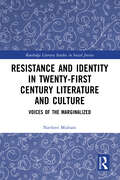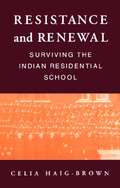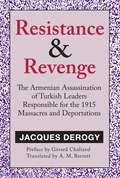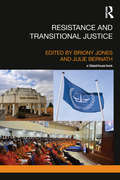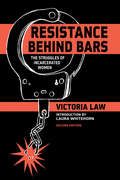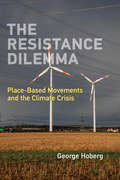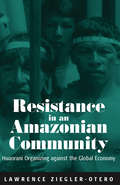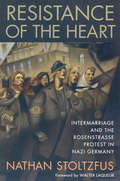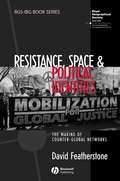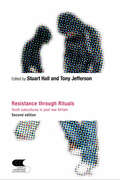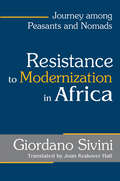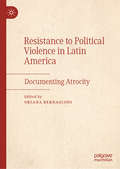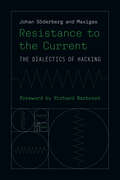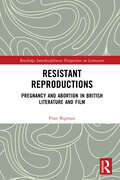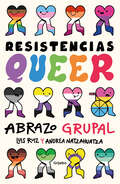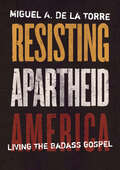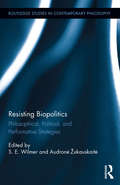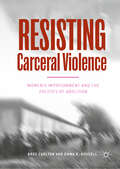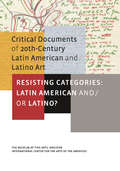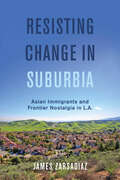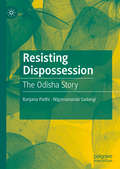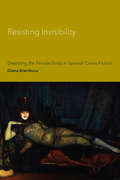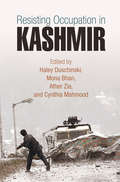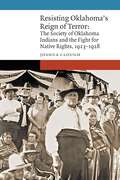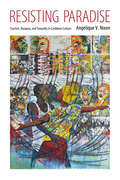- Table View
- List View
Resistance and Identity in Twenty-First Century Literature and Culture: Voices of the Marginalized (Routledge Literary Studies in Social Justice)
by Navleen MultaniResistance and Identity in Twenty-First Century Literature and Culture: Voices of the Marginalized is a compendium of reflections on literary texts, politics of literature and culture. The book proffers ruminations on the pivotal role of constructive and positive resistance to reconstruct identities for meaningful human existence. The disciplinary power and dominance coerce the natural body to resist and yearn for freedom. One can establish unique identity by refusing to conform to pressures of society that deform the natural body. Dominant forces and oppressive structures evoke resistance that can range from 'polite demurral' to 'refusal'. Resistance comes from the 'will' that refuses to be controlled and governed. The 'refusal' of the ordinary illuminates ordinary lives/ bodies. Language and literary texts contain essential truths of such human existence. Words and imaginary worlds in literary works reveal truth and suggest possibilities for reconfiguring the order.
Resistance and Renewal
by Celia Haig-BrownOne of the first books published to deal with the phenomenon of residential schools in Canada, Resistance and Renewal is a disturbing collection of Native perspectives on the Kamloops Indian Residential School(KIRS) in the British Columbia interior. Interviews with thirteen Natives, all former residents of KIRS, form the nucleus of the book, a frank depiction of school life, and a telling account of the system's oppressive environment which sought to stifle Native culture.
Resistance and Revenge: Armenian Assassination of Turkish Leaders Responsible for the 1915 Massacres and Deportations
by Jacques DerogyInitially published in French under the title Operation Nemesis, this revealing work is now available to the English-speaking public for the first time. It ranks as a major revision in the historic study of the Armenian resistance to the Ottoman genocide of Armenians.Operation Nemesis is a study of the Armenian Revolutionary Federation (the Tashnak Party) and the individuals responsible for the execution of Turkish leaders. Until Derogy's book, it had been assumed that the assassins were acting out of personal and emotional motives. But through an amazing amount of detective work, it becomes clear that they were in fact part of a disciplined effort to seek retribution for historic crimes against the Armenian people.The work richly details Turkish plans for the liquidation of the Armenian people, the individuals selected to liquidate the genocidists, and above all, and most complex, to document for the first time the role of the organized Armenian political opposition to Turkish rule. In doing so, Derogy brings to light the relation between the legal party and its extra-legal arm; the mechanisms needed to implement the daring plan of assassination; and the special postwar circumstances in which the Armenian nation found itself - torn asunder by a Turkish-Soviet detente in which the independence of Armenia became the sacrificial pawn.Derogy worked closely with scholars around the world, and interviewed firsthand remaining survivors who had direct contact with the events described. His is a detective story of the first rank, no less than a piece of historical reconstruction with obvious portent for current Armenian efforts to recapture political legitimacy and personal pride.
Resistance and Transitional Justice
by Briony Jones Julie BernathDespite a more reflective concern over the past 20 years with marginalised voices, justice from below, power relations and the legitimacy of mechanisms and processes, scholarship on transitional justice has remained relatively silent on the question of ‘resistance’. In response, this book asks what can be learnt by engaging with resistance to transitional justice not just as a problem of process, but as a necessary element of transitional justice. Drawing on literatures about resistance from geography and anthropology, it is the social act of labelling resistance, along with its subjective nature, that is addressed here as part of the political, economic, social and cultural contexts in which transitional justice processes unfold. Working through three cases – Côte d’Ivoire, Burundi and Cambodia – each chapter of the book addresses a different form or meaning of resistance, from the vantage point of multiple actors. As such, each chapter adds a different element to an overall argument that disrupts the norm/deviancy dichotomy that has so far characterised the limited work on resistance and transitional justice. Together, the chapters of the book develop cross-cutting themes that elaborate an overall argument for considering resistance to transitional justice as a subjective element of a political process, rather than as a problem of implementation.
Resistance Behind Bars: The Struggles of Incarcerated Women
by Victoria Law Laura WhitehornAs it examines daily struggles against appalling prison conditions and injustices, this collection of real-life prisoners' stories and analysis of the prison landscape as it is today documents both collective organizing and individual resistance among women incarcerated in the United States. In 1974, women imprisoned at New York's maximum-security prison at Bedford Hills staged what is known as the August Rebellion. Protesting the brutal beating of a fellow prisoner, the women fought off guards, holding seven of them hostage, and took over sections of the prison. While many have heard of the 1971 Attica prison uprising, the August Rebellion remains relatively unknown even in activist circles. Resistance Behind Bars challenges and seeks to change such oversights. Emphasizing women's agency in resisting the conditions of their confinement through forming peer education groups, clandestinely arranging ways for children to visit mothers in distant prisons, and raising public awareness about their lives, the book will spark further discussion and research into the lives of incarcerated women and galvanize much-needed outside support for their struggles. This updated and revised edition includes a new chapter about transgender, transsexual, intersex, and gender-variant people in prison and the specific challenges that they face.
The Resistance Dilemma: Place-Based Movements and the Climate Crisis (American and Comparative Environmental Policy)
by George HobergHow organized resistance to new fossil fuel infrastructure became a political force, and how this might affect the transition to renewable energy.Organized resistance to new fossil fuel infrastructure, particularly conflicts over pipelines, has become a formidable political force in North America. In this book, George Hoberg examines whether such place-based environmental movements are effective ways of promoting climate action, if they might inadvertently feed resistance to the development of renewable energy infrastructure, and what other, more innovative processes of decision-making would encourage the acceptance of clean energy systems. Focusing on a series of conflicts over new oil sands pipelines, Hoberg investigates activists&’ strategy of blocking fossil fuel infrastructure, often in alliance with Indigenous groups, and examines the political and environmental outcomes of these actions. After discussing the oil sands policy regime and the relevant political institutions in Canada and the United States, Hoberg analyzes in detail four anti-pipeline campaigns, examining the controversies over the Keystone XL, the most well-known of these movements and the first one to use infrastructure resistance as a core strategy; the Northern Gateway pipeline; the Trans Mountain pipeline; and the Energy East pipeline. He then considers the &“resistance dilemma&”: the potential of place-based activism to threaten the much-needed transition to renewable energy. He examines several episodes of resistance to clean energy infrastructure in eastern Canada and the United States. Finally, Hoberg describes some innovative processes of energy decision-making, including strategic environment assessment, and cumulative impact assessment, looking at cases in British Columbia and Lower Alberta.
Resistance In An Amazonian Community
by Lawrence Ziegler-OteroLike many other indigenous groups, the Huaorani of eastern Ecuador are facing many challenges as they attempt to confront the globalization of capitalism in the 21st century. In 1991, they formed a political organization as a direct response to the growing threat to Huaorani territory posed by oil exploitation, colonization, and other pressures. The author explores the structures and practices of the organization, as well as the contradictions created by the imposition of an alien and hierarchical organizational form on a traditionally egalitarian society. This study has broad implications for those who work toward "cultural survival" or try to "save the rainforest."
Resistance of the Heart
by Nathan StoltzfusIn February 1943 the Gestapo arrested approximately 10,000 Jews remaining in Berlin. Most died at Auschwitz. Two thousand of those Jews, however, had non-Jewish partners and were locked into a collection center on a street called Rosenstrasse. As news of the surprise arrest pulsed through the city, hundreds of Gentile spouses, mostly women, hurried to the Rosenstrasse in protest. A chant broke out: "Give us our husbands back."Over the course of a week protesters vied with the Gestapo for control of the street. Now and again armed SS guards sent the women scrambling for cover with threats that they would shoot. After a week the Gestapo released these Jews, almost all of whom survived the war.The Rosenstrasse Protest was the triumphant climax of ten years of resistance by intermarried couples to Nazi efforts to destroy their families. In fact, ninety-eight percent of German Jews who did not go into hiding and who survived Nazism lived in mixed marriages. Why did Hitler give in to the protesters? Using interviews with survivors and thousands of Nazi records never before examined in detail, Nathan Stoltzfus identifies the power of a special type of resistance--the determination to risk one's own life for the life of loved ones. A "resistance of the heart..."
Resistance, Space and Political Identities: The Making of Counter-Global Networks (RGS-IBG Book Series #62)
by David FeatherstoneUtilizing research on networked struggles in both the 18th-century Atlantic world and our modern day, Resistance, Space and Political Identities: The Making of Counter-Global Networks challenges existing understandings of the relations between space, politics, and resistance to develop an innovative account of networked forms of resistance and political activity. Explores counter-global struggles in both the past and present—including both the 18th-century Atlantic world and contemporary forms of resistance Examines the productive geographies of contestation Foregrounds the solidarities and geographies of connection between different place-based struggles and argues that such solidarities are essential to produce more plural forms of globalization
Resistance Through Rituals: Youth Subcultures in Post-War Britain (Cultural Studies Birmingham)
by Stuart Hall Tony JeffersonThis revised and expanded edition of Resistance through Rituals includes a new introduction to bring the reader fully up-to-date with the changes that have happened since the work’s first release in the double issue of Working Papers in Cultural Studies in 1975. The work of the Centre for Contemporary Cultural Studies at Birmingham has been noted as historically leading the field in new areas of enquiry within the field of cultural studies, and the papers from the Centre are canonical reading for many cultural studies students. This revised edition includes all the original, exceptional papers, and enhances these with the reflections of the editors thirty years after the original publication. At a time when youth culture had been widely publicised, but few people understood its significance as one of the most striking and visible manifestations of social and political change, these papers redressed the balance. Looking in detail at the wide range of post-war youth subcultures, from teds, mods and skinheads to black Rastafarians, Resistance through Rituals considers how youth culture reflects and reacts to cultural change. This text represents the collective understanding of the leading centre for contemporary culture, and serves to situate some of the most important cultural work of the twentieth century in the new millennium.
Resistance to Modernization in Africa: Journey Among Peasants and Nomads
by Giordano Sivini Joan Krakover HallGiordano Sivini has been an international aid consultant for over twenty-five years. Here he channels a 1960s and 1970s idealistic political commitment into fieldwork and the sphere of development from the 1980s to the present. Sivini writes with both passion and cynicism about his experiences with the numerous African aid projects he has been involved with over the years.While the fathers of independence of British and French decolonization wanted to change the colonial conditions of exploitation, Sivini finds that their good intentions have been shipwrecked. Ironically, the longer Sivini served as an aid consultant, the more he found himself dismayed at the various projects that were under way or slated to begin. He perceived some of the projects as grotesque, and, almost all ineffective. The money was wasted on such ventures not because of a particular government's interest in the social effects they would have on the local populace, but because of the direct and indirect benefits the government would receive.Sivini sees international development aid as its own market: development is a commodity that takes the form of large and small projects, and is traded for loans and gifts to generate political and economic advantages for the institutional participants in the exchange. Ultimately, governmental and aid projects often stimulate resistance from the local populace as agencies upset their usual system of production by regimenting peasants to produce for the market, then appropriate the cattle of nomadic pastoralists, villagizing and resettling peasants in areas of high productivity, and exploiting laborers in large farms. This creates social disintegration, mass migration in urban informal economy, and poverty.This is a dynamic and moving analysis of foreign aid that will be of interest to students of African studies, governmental programs, rural development, and political economy.
Resistance to Political Violence in Latin America: Documenting Atrocity
by Oriana BernasconiThis book analyzes state terror documentation as a form of peaceful resistance to oppressive regimes through substantial research in human rights archives that registered violations perpetrated by Augusto Pinochet’s dictatorship in Chile. The contributors provide in-depth analysis on state violence documentation, denunciation and resistance and how it affected civilians, activists and victims. Additionally, the project introduces research in transitional contexts (post-dictatorship, post-apartheid and post-colonialism) showing the role of documentation practices in achieving truth, reparation and justice. This work will be relevant to academics, students and researchers in the fields of political science, political history, Latin American and memory studies.
Resistance to the Current: The Dialectics of Hacking (Information Policy)
by Johan Soderberg MaxigasHow hacking cultures drive contemporary capitalism and the future of innovation.In Resistance to the Current, Johan Söderberg and Maxigas examine four historical case studies of hacker movements and their roles in shaping the twenty-first-century&’s network society. Based on decades of field work and analysis, this intervention into current debates situates an exploding variety of hacking practices within the contradictions of capitalism. Depoliticized accounts of computing cultures and collaborative production miss their core driver, write Söderberg and Maxigas: the articulation of critique and its recuperation into innovations.Drawing on accounts of building, developing, and running community wireless networks, 3D printers, hackerspaces, and chat protocols, the authors develop a theoretical framework of critique and recuperation to examine how hackers—who have long held a reputation for being underground rebels—transform their outputs from communal, underground experiments to commercial products that benefit the state and capital. This framework allows a dialectical understanding of contemporary social conflicts around technology and innovation. Hackers&’ critiques of contemporary norms spur innovation, while recuperation turns these innovations into commodified products and services. Recuperation threatens the autonomy of hacker collectives, harnessing their outputs for the benefit of a capitalist system.With significant practical implications, this sophisticated multidisciplinary account of technology-oriented movements that seek to challenge capitalism will appeal to science and technology readers interested in innovation studies, user studies, cultural studies, and media and communications.
Resistant Reproductions: Pregnancy and Abortion in British Literature and Film (Routledge Interdisciplinary Perspectives on Literature)
by Fran BigmanResistant Reproductions asks why narratives of pregnancy and abortion emerged in the early twentieth century and what kinds of stories these narratives conveyed. Is it only once pregnancy becomes plannable that it becomes a story worth telling? Abortion is often considered resistant and feminist, while pregnancy is considered domestic and conventional. How can readings of literary narratives challenge this reductive binary?Resistant Reproductions, the first book-length study of both pregnancy and abortion in British culture, addresses these questions by examining pregnancy narratives, including abortion narratives, in British fiction and film from 1907 to 1967. Fiction became a way for writers to explore what new possibilities of reproductive control would mean for the individual, yet there was also much anxiety about who would have control: individuals or the state. While exploring intimate personal experiences of pregnancy and abortion, Resistant Reproductions also asks how literary narratives used reproductive plots to address political issues of gender, class, and eugenics.
Resistencias queer: Abrazo grupal
by Andrea Natzahuatza Luis RuizFrente a quienes insisten en ver a las personas LGBTQ+ como un peligro, nuestra rebeldía es ser felices, libres y ruidosxs . Hay muchos libros sobre salir del clóset. Este no es uno de ellos. Preferimos, en cambio, preguntarnos cómo podemos construir una sociedad en la que los clósets no existan. Hay que dejar de pensar lo heterosexual y lo cisgénero como «lo normal», leer el mundo con ojos distintos, reconociendo que hay una infinidad de maneras de amar, desear, relacionarnos, ser y expresarnos y que todas son válidas. En estas páginas encontrarás una colección de textos originales sobre temas que a las personas LGBTQ+ nos importan, conceptos clave para entender las discusiones sobre diversidad sexual y de género, historias de las personas rebeldes que lucharon antes que nosotrxs, mucho chismecito queer y herramientas valiosas —¡y divertidas!— para formar comunidad, cuidarnos a nosotrxs mismxs y a las personas con quienes compartimos lucha. Los autores dicen: «Resistir, para las poblaciones LGBTQ+, no es una opción, sino la única forma viable para existir en un mundo que se niega a escuchar nuestras voces». Luis y Andrea, de Abrazo Grupal
Resisting Apartheid America: Living the Badass Gospel
by Miguel A. De La TorreMiguel De La Torre foresees a future America dominated by white nationalists—and equips us with the tools to resist it. In Burying White Privilege, he opened our eyes to white Christians&’ complicity in maintaining racist hierarchy in America. In its sequel, Decolonizing Christianity, he encouraged us to decolonize Christianity and return it to its revolutionary roots. Now, in his conclusion to the trilogy, Miguel A. De La Torre shows us the America on our horizon, should we continue down the path of heretical white Christianity—and the outlook is not bright. Resisting Apartheid America assesses the past and present threads of systemic racism in American politics, from Plymouth Rock to the Capitol on January 6. Sweeping and unsparing in his critique, De La Torre takes on authors revered in Christian theology, including Paul, Augustine, and heroes of the Reformation, aiming to uproot the ideological foundations of racism in Christianity. Following these through lines of oppression, he warns of a decline in democracy and rise in political violence—but equips us with the nonviolent ethical framework to resist this bleak future. Resisting Apartheid America is a clarion call to Christians to remake America in the image of the God of liberation.
Resisting Biopolitics: Philosophical, Political, and Performative Strategies (Routledge Studies in Contemporary Philosophy)
by S. E. Wilmer Audronė ŽukauskaitėThe topic of biopolitics is a timely one, and it has become increasingly important for scholars to reconsider how life is objectified, mobilized, and otherwise bound up in politics. This cutting-edge volume discusses the philosophical, social, and political notions of biopolitics, as well as the ways in which biopower affects all aspects of our lives, including the relationships between the human and nonhuman, the concept of political subjectivity, and the connection between art, science, philosophy, and politics. In addition to tracing the evolving philosophical discourse around biopolitics, this collection researches and explores certain modes of resistance against biopolitical control. Written by leading experts in the field, the book’s chapters investigate resistance across a wide range of areas: politics and biophilosophy, technology and vitalism, creativity and bioethics, and performance. Resisting Biopolitics is an important intervention in contemporary biopolitical theory, looking towards the future of this interdisciplinary field.
Resisting Carceral Violence: Women's Imprisonment and the Politics of Abolition (Critical Criminological Perspectives)
by Bree Carlton Emma K. RussellThis book explores the dramatic evolution of a feminist movement that mobilised to challenge a women’s prison system in crisis. Through in-depth historical research conducted in the Australian state of Victoria that spans the 1980s and 1990s, the authors uncover how incarcerated women have worked productively with feminist activists and community coalitions to expose, critique and resist the conditions and harms of their confinement. Resisting Carceral Violence tells the story of how activists—through a combination of creative direct actions, reformist lobbying and legal challenges—forged an anti-carceral feminist movement that traversed the prison walls. This powerful history provides vital lessons for service providers, social justice advocates and campaigners, academics and students concerned with the violence of incarceration. It calls for a willingness to look beyond the prison and instead embrace creative solutions to broader structural inequalities and social harm.
Resisting Categories: Latin American and/or Latino?
by Mari Carmen Ramirez Hector Olea Tomas Ybarra-FraustoThis first volume of the Critical Documents of 20th-Century Latin American and Latino Art series published by the International Center for the Arts of the Americas at the Museum of Fine Arts, Houston, presents 168 crucial texts written by influential artists, critics, curators, journalists, and intellectuals whose writings shed light on questions relating to what it means to be "Latin American" and/or "Latino."Reinforced within a critical framework, the documents address converging issues, including: the construct of "Latin-ness" itself; the persistent longing for a continental identity; notions of Pan-Latin Americanism; the emergence of collections and exhibitions devoted specifically to "Latin American" or "Latino" art; and multicultural critiques of Latin American and Latino essentialism. The selected documents, many of which have never before been published in English, span from the late fifteenth century to the present day. They encompass key protagonists of this comprehensive history as well as unfamiliar figures, revealing previously unknown facets of the questions and issues at play. The book series complements the thousands of seminal documents now available through the ICAA Documents of 20th-Century Latin American and Latino Art digital archive, http://icaadocs.mfah.org. Together they establish a much-needed intellectual foundation for the exhibition, collection, and interpretation of art produced in Latin America and among Latino populations in the United States.
Resisting Change in Suburbia: Asian Immigrants and Frontier Nostalgia in L.A. (American Crossroads #67)
by James ZarsadiazBetween the 1980s and the first decade of the twenty-first century, Asian Americans in Los Angeles moved toward becoming a racial majority in the communities of the East San Gabriel Valley. By the late 1990s, their "model minority" status resulted in greater influence in local culture, neighborhood politics, and policies regarding the use of suburban space. In the "country living" subdivisions, which featured symbols of Western agrarianism including horse trails, ranch fencing, and Spanish colonial architecture, white homeowners encouraged assimilation and enacted policies suppressing unwanted "changes"—that is, increased density and influence of Asian culture. While some Asian suburbanites challenged whites' concerns, many others did not. Rather, white critics found support from affluent Asian homeowners who also wished to protect their class privilege and suburbia's conservative Anglocentric milieu. In Resisting Change in Suburbia, award-winning historian James Zarsadiaz explains how myths of suburbia, the American West, and the American Dream informed regional planning, suburban design, and ideas about race and belonging.
Resisting Dispossession: The Odisha Story
by Ranjana Padhi Nigamananda SadangiThe book brings to the reader a set of political and social narratives woven around people’s resistance against big dams, mining and industrial projects, in short, displacement and dispossession in Odisha, India. This saga of dispossession abounds with stories and narratives of ordinary peasants, forest dwellers, fisher folk and landless wage laborers, which make the canvas of resistance history more complete. The book foregrounds these protagonists and the events that marked their lives; they live in the coastal plains as well as the hilly and forested areas of south and south-west Odisha.The authors have chronicled the development trajectory from the construction of the Hirakud Dam in the 1950s to the entry of corporations like POSCO and Vedanta in contemporary times. It thus covers extensive ground in interrogating the nature of industrialization being ushered into the state from post-independent India till today. The book depicts how and why people resist the development juggernaut in a state marked with endemic poverty. In unraveling this complex reality, the book conveys the world view of a vast section of people whose lives and livelihoods are tied up to land, forests, mountains, seas, rivers, lakes, ponds, trees, vines and bushes. These narratives fill a yawning gap in resistance literature in the context of Odisha. In doing so, they resonate with the current predicament of people in other mineral-rich states in Eastern India. The book is an endeavour to bring Odisha on the map of resistance politics and social movements in India and across the world.
Resisting Invisibility: Detecting the Female Body in Spanish Crime Fiction (Toronto Iberic)
by Diana AramburuEngaging with pre-feminist and male-authored crime literature, Resisting Invisibility offers a comparative reading of women’s bodies as represented in Spanish crime literature from the mid-nineteenth century to the present. Utilizing the twin concepts of visibility and invisibility, the book establishes a genealogy of differing viewpoints regarding women’s positions in these narratives, before and after the birth of the modern Spanish female detective. This examination of the politics of female visibility expands our understanding of the aesthetic regimes that have governed the female body from the early phases of the genre’s evolution. While most scholars understand the feminization of the crime genre as a response to second-wave feminism, Resisting Invisibility demonstrates that even in the earliest representations of delinquent women, the politics surrounding the female body are problematized and are more complex than previously conceptualized. Drawing on gender and queer studies, Resisting Invisibility investigates the gendering of crime fiction, forcing us to reconsider the literary history of female visibility and prompting us to establish an alternative genealogy for Spanish crime literature.
Resisting Occupation in Kashmir: Military Occupation And Women's Activism In Kashmir (The Ethnography of Political Violence)
by Haley Duschinski Mona Bhan Ather Zia Cynthia MahmoodThe last decade has been a transformative period in Kashmir, the hotly contested and densely militarized border territory located high in the Himalayan mountains between India and Pakistan. Suppressed and unheard, Kashmiri political aspirations were subordinated to larger geopolitical concerns—by opposing governments laying claim to Kashmir, by security experts promoting bilateral peace settlements in the region, and by academic researchers studying the conflict. But since 2008, Kashmiris who grew up in the midst of armed insurgency and counterinsurgency warfare have been deploying new strategies for challenging India's state and military apparatus and projecting their legal and political claims for freedom from Indian rule to global audiences. Resisting Occupation in Kashmir analyzes the social and legal logic of India's occupation of Kashmir in relation to colonialism, militarization, power, democracy, and sovereignty. It also traces how Kashmiri youth are drawing on the region's long history of armed rebellion against Indian domination to reimagine the freedom struggle in the twenty-first century.Resisting Occupation in Kashmir presents new ways of thinking and writing about Kashmir that cross conventional boundaries and point toward alternative ways of conceptualizing the past, present, and future of the region. The volume brings together junior and senior scholars from various disciplinary backgrounds who have conducted extensive fieldwork during the past decade in various regions of Kashmir. The contributors, many of whom were born and raised during the peak of the conflict in the 1990s, offer ethnographically grounded perspectives on contemporary social, legal, and political life in ways that demonstrate the multiplicity of experiences of Kashmiri communities. The essays highlight the ways in which this scholarly orientation—built through collaboration and dialogue across different kinds of borders—offers a new critical approach to Kashmir studies at this transformative and generative moment.Contributors: Mona Bhan, Haley Duschinski, Farrukh Faheem, Gowhar Fazili, Bruce Hoffman, Mohamad Junaid, Seema Kazi, Ershad Mahmud, Cynthia Mahmood, Saiba Varma, Ather Zia.
Resisting Oklahoma's Reign of Terror: The Society of Oklahoma Indians and the Fight for Native Rights, 1923–1928 (New Visions in Native American and Indigenous Studies)
by Dr. Joshua CloughThe oil and natural gas boom in pre–World War I Oklahoma brought unbelievable wealth to thousands of tribal citizens in the state on whose lands these minerals were discovered. However, as Angie Debo recognizes in her seminal study of the period, And Still the Waters Run, and, more recently, as David Grann does in Killers of the Flower Moon, this affluence placed Natives in the crosshairs of unscrupulous individuals. As a result, this era was also marked by two of the most heinous episodes of racial violence in the state&’s history: the Tulsa Race Massacre of 1921 and the Osage Murders between 1921 and 1925. In Resisting Oklahoma&’s Reign of Terror Joshua Clough details the responses of one largely forgotten Native organization—the Society of Oklahoma Indians (SOI)—to the violence and pillaging of tribal resources during the 1920s. Clough provides historical understanding of its formation and its shared values of intertribal unity, Native suffrage, and protection of Native property. He also reveals why reform efforts were nearly impossible in 1920s Oklahoma and how this historical perspective informs today&’s conflicts between the state and its Indigenous inhabitants. Through this examination of the SOI, Clough fills the historiographic gap regarding formal Native resistance between the dissolution of the national Society of American Indians in 1923 and the formation of the National Congress of American Indians in 1944. Dismissed or overlooked for a century as an inconsequential Native activist organization, the history of the SOI, when examined carefully, reveals the sophistication and determination of tribal members in their struggle to prevent depredations on their persons and property.
Resisting Paradise: Tourism, Diaspora, and Sexuality in Caribbean Culture (Caribbean Studies Series)
by Angelique V. NixonWinner of the Caribbean Studies Association's 2016 Barbara T. Christian Award for Best Book in the Humanities Tourists flock to the Caribbean for its beaches and spread more than just blankets and dollars. Indeed, tourism has overly affected the culture there. Resisting Paradise explores the import of both tourism and diaspora in shaping Caribbean identity. It examines Caribbean writers and others who confront the region's overdependence on the tourist industry and the many ways that tourism continues the legacy of colonialism. Angelique V. Nixon interrogates the relationship between culture and sex within the production of “paradise” and investigates the ways in which Caribbean writers, artists, and activists respond to and powerfully resist this production. Forms of resistance include critiquing exploitation, challenging dominant historical narratives, exposing tourism's influence on cultural and sexual identity in the Caribbean and its diaspora, and offering alternative models of tourism and travel. Resisting Paradise places emphasis on the Caribbean people and its diasporic subjects as travelers and as cultural workers contributing to alternate and defiant understandings of tourism in the region. Through a unique multidisciplinary approach to comparative literary analysis, interviews, and participant observation, Nixon analyzes the ways Caribbean cultural producers are taking control of representation. While focused mainly on the Anglophone Caribbean, the study covers a range of territories including Antigua, the Bahamas, Grenada, Haiti, Jamaica, as well as Trinidad and Tobago, to deliver a potent critique.
